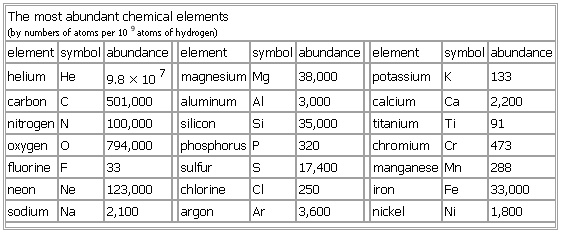most abundant chemical elements
- most abundant chemical elements
-
The most abundant chemical elements
(by numbers of atoms per 109 atoms of hydrogen)
element symbol abundance element symbol abundance element symbol abundance
helium He 9.8 × 107 magnesium Mg 38,000 potassium K 133
carbon C 501,000 aluminum Al 3,000 calcium Ca 2,200
nitrogen N 100,000 silicon Si 35,000 titanium Ti 91
oxygen O 794,000 phosphorus P 320 chromium Cr 473
fluorine F 33 sulfur S 17,400 manganese Mn 288
neon Ne 123,000 chlorine Cl 250 iron Fe 33,000
sodium Na 2,100 argon Ar 3,600 nickel Ni 1,800
See as table:
* * *
Universalium.
2010.
Look at other dictionaries:
Abundance of the chemical elements — Estimated proportions of matter, dark matter and dark energy in the universe. Only the fraction of the mass and energy in the universe labeled atoms is composed of chemical elements. The abundance of a chemical element measures how relatively… … Wikipedia
chemical element — Introduction also called element, any substance that cannot be decomposed into simpler substances by ordinary chemical processes. Elements are the fundamental materials of which all matter is composed. This article considers the… … Universalium
Chemical element — The periodic table of the chemical elements A chemical element is a pure chemical substance consisting of one type of atom distinguished by its atomic number, which is the number of protons in its nucleus.[1] Familiar examples of … Wikipedia
chemical compound — Introduction any substance composed of identical molecules consisting of atoms (atom) of two or more chemical elements (chemical element). All the matter in the universe is composed of the atoms of more than 100 different chemical elements … Universalium
Chemical formula — Al2(SO4)3 Example of a chemical formula, aluminium sulfate A chemical formula or molecular formula is a way of expressing information about the atoms that constitute a particular chemical compound. The chemical formula identifies each constituent … Wikipedia
Chemical law — Chemical laws are those laws of nature relevant to chemistry. The most fundamental concept in chemistry is the law of conservation of mass, which states that there is no detectable change in the quantity of matter during an ordinary chemical… … Wikipedia
chemical industry — Introduction complex of processes, operations, and organizations engaged in the manufacture of chemicals and their derivatives. Although the chemical industry may be described simply as the industry that uses chemistry and… … Universalium
List of fictional elements, materials, isotopes and atomic particles — This list contains chemical elements, materials, isotopes or (sub)atomic particle that exist primarily in works of fiction (usually fantasy or science fiction). No actual periodic elements end in ite , though many minerals have names with this… … Wikipedia
star — starless, adj. /stahr/, n., adj., v., starred, starring. n. 1. any of the heavenly bodies, except the moon, appearing as fixed luminous points in the sky at night. 2. Astron. any of the large, self luminous, heavenly bodies, as the sun, Polaris,… … Universalium
Geology of Mars — Mars Mars as seen by the Hubble Space Telescope Designations … Wikipedia

